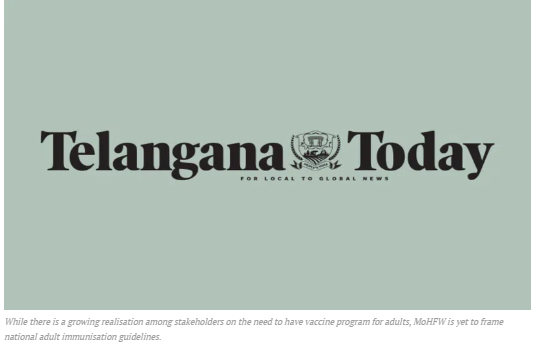Health and Tech: India still falls behind in adult immunisation

While there is a growing realisation among stakeholders on the need to have vaccine program for adults, MoHFW is yet to frame national adult immunisation guidelines.
Hyderabad: The highly successful Universal Immunisation Programme (UIP) in India has traditionally focussed on ensuring all children from infancy to the age of 15 years are vaccinated against an array of Vaccine Preventable Diseases (VPD). In contrast, the concept of vaccinating adults, which is highly prevalent in Western countries, has not taken root in India, where coverage and awareness on adult immunisation are poor.
In the last few years, however, general practitioners and even specialists have started advising vaccines to adults, especially those with comorbid conditions, so that they can lead a quality life instead of falling sick, often leading to a life-threatening event.
All the major associations in India representing physicians, surgeons and specialty doctors, World Health Organisation (WHO) and Centres for Disease Control and Prevention (CDC) in the US have advocated for having a well-developed immunisation programme for adults.
Some of the most common vaccines that are being frequently prescribed by doctors for adults, above 50 years, in India are the annual flu shots, Hepatitis B, pneumococcal vaccines against pneumonia and HPV vaccine for cervical cancer. However, almost all such vaccines are costly and have remained accessible to only those who can afford them.
While there is a growing realisation among stakeholders on the need to have vaccine program for adults, the Ministry of Health and Family Welfare (MoHFW) is yet to frame national adult immunisation guidelines. As a result, there is no clear-cut path to decide who should receive what vaccine based on their age and pre-existing medical conditions.
“Under UIP, there is a lot of focus in ensuring every child in the country is vaccinated but the concept of adult immunisation is still in its infancy in India. Thanks to the development of medical technology, there are several vaccines that are recommended for adults, especially those with pre-existing medical conditions. However, at present, such vaccines are limited to patients who can afford them,” says senior pulmonologist and superintendent, Chest Hospital, Dr Mahaboob Khan.
Despite lack of guidelines from MOHFW, there are several associations including Association of Physicians in India, Indian Society of Nephrology and Geriatric Society of India that have highlighted the need for pushing adult vaccination.
Why adult immunisation programme is needed in India?
The case to have a robust framework for adult immunisation program in India is the anticipated rise of the geriatric population in the coming decades. Based on National Statistical Office (NS), Ministry of Statistics and Programme Implementation, GoI, the country’s elderly population (aged 60 and above) is projected to touch 194 million (19.4 crore) in 2031 from 138 million (13.8 crore) in 2021, a 41 per cent increase over the decade.
Flagging concerns around an ageing population and stressing the need for India to plan for a changing population structure, the report said there will be 93 million males (9.3 crore) and 101 million females (10 crore) in 2031, up from 67 million (6.7 crore) males and 71 million females (7.1 crore) in 2021.
Needless to say, the ageing Indian population in the coming decades will cause a significant rise in a variety of diseases because of drop in their immunity levels. The elderly population in India, especially with comorbid conditions will be vulnerable to infectious diseases like pneumonia, influenza, Hepatitis. The ideal way to address this challenge is to have well tested vaccination programme, which will boost the immunity levels of the elderly in India.







